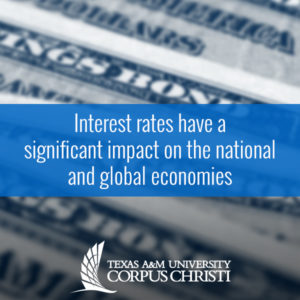Sometimes, a small change can pack a big punch. This is certainly true of interest rate fluctuations — even seemingly minor, incremental changes can have major consequences for the economy, as became abundantly clear to the U.S. public during and after the COVID-19 pandemic. The effects of interest rates and what they mean to the economy as a whole — and to our individual micro-economies — are complex and widely impactful.
While people tend to pay more attention to interest rates when they are in the market for a mortgage or are carrying credit card debt, they do not typically notice daily interest rate trends and volatility. What they may not realize is that nuanced fluctuations in interest rates can have a significant impact on the national and global economies and, in turn, our lives.
Interest rates effect both investment returns and borrowing costs in dramatic ways. As such, interest rates are a fundamental topic of advanced study for finance professionals who help people and organizations navigate the complexities of financial management, risk management and planning.
What Is Interest?
Put simply, interest is the price you pay to use someone else’s money. It is calculated as a fraction of the amount you use and usually quoted as an annual percentage. Interest is also the amount someone pays to borrow your money, such as the interest you earn on your bank deposit.
Interest rates in the U.S. are the responsibility of the Federal Open Market Committee (FOMC), which is a branch of the Federal Reserve System, often referred to as “the Fed.” Based on numerous economic and social factors, this group determines the country’s monetary policy. Any changes the Fed makes to interest rates piques the interest of businesses and economic leaders because interest rates have a far-reaching effect on the economy.
How Interest Rates Affect the Economy
In general, the Fed determines interest rates based on how it wants to manage the economy and inflation. If prices are climbing too quickly, the Fed raises interest rates to put the brakes on the economy by slowing down spending. The theory is that when interest rates are high, people leave their money in the bank where it can accumulate interest. Consumer spending will likely fall — especially on big-ticket items like homes — because the higher interest rates give buyers pause or makes these purchases unaffordable.
If the economy is flagging, however, and needs an infusion of cash, jobs and business growth, the Fed lowers interest rates. Lower rates, which translate to slow savings growth, provide consumers with little incentive to keep money in the bank. They also encourage spending, and larger purchases — such as cars or homes — become more affordable.
An extremely clear, recent example of the Fed putting monetary policy to use is the incremental adjustment of interest rates during and after the COVID-19 pandemic. As the pandemic set in, the government took many steps to ease economic challenges for the U.S. public and keep the economy afloat. An important component of this was lowering the Federal Reserve interest rate, encouraging spending and business growth and making large credit-based purchases far more affordable.
Along with economic stimulus and other governmental measures, lowering the interest rate jumpstarted the pandemic-ravaged economy and induced an impressively rapid economic rebound. Yet this rebound was perhaps too fast and forceful, spurring levels of economic growth and spending that led to extremely high inflation.
The Fed responded accordingly, incrementally raising interest rates to combat inflation, effectively slowing the economy down. As the public now knows, this process of tamping down rampant inflation with adjustments to the Federal Reserve interest rate is extremely delicate and takes time — slowing the economy too much and too quickly can lead to a recession. In this case, the Fed attempted to strike a balance, getting inflation back to target levels while avoiding a recession, hopefully achieving what is known as a “soft landing.”
Stocks and Bonds
The effects of interest rates on stock and bonds are also significant. In general, if the return on financial instruments like bonds is high, consumers are more likely to invest in them, which leaves them with less expendable income to put into circulation.
This lack of spending then usually causes the stock value of individual businesses to decrease because corporations are generating less revenue. Conversely, when interest rates are low, both consumers and companies tend to increase spending, which increases profits and stock values for corporations.
MBA in Finance
Understanding the effects of interest rates on markets, consumer and business spending, recessions, and inflation is important for any business leader. Earning a Master of Business Administration (MBA) in finance is one of the best ways to gain the skills to help an organization navigate an ever-changing economy.
The online MBA with a Concentration in Finance from Texas A&M University-Corpus Christi (TAMU-CC) provides finance professionals with the expertise needed to manage a company’s responses to market fluctuations. Coursework in this advanced degree program provides candidates with a sophisticated understanding of the economic issues surrounding multinational finance, investment policy, the effect of interest rates on financial markets and more. Additionally, the online design of TAMU-CC’s MBA in Finance gives students with jobs or family commitments the flexibility to pursue additional education without interrupting their lives.
Interest rates continue to influence businesses of all sizes in an increasingly complex economy, and an MBA in finance can provide you with the knowledge you need to help any organization adapt and prosper.
Learn more about the TAMU-CC online MBA with a Concentration in Finance program.
